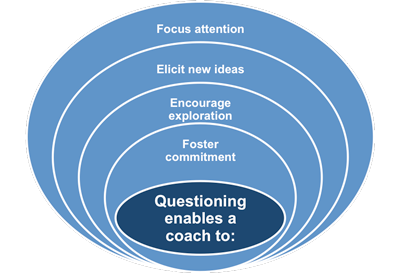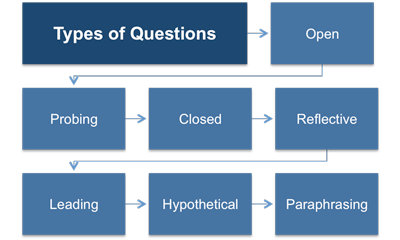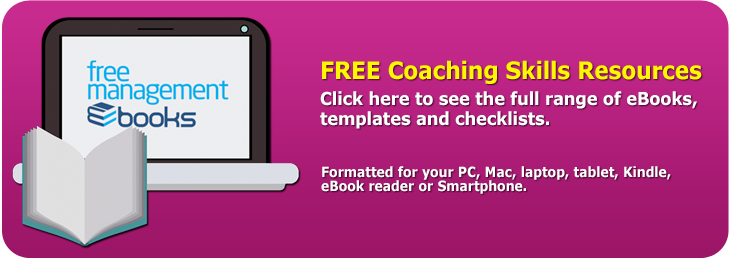Asking Questions in a Coaching Session
A significant part of active listening that warrants further exploration when being used by a coach is the art of questioning. The most effective way to elicit the coachee's ideas of how to approach the issue facing them is to ask the right questions.
 |
Developing the ability to ask 'searching' questions that draw out the information needed to aid the coachee's understanding and help them find a resolution is crucial to your success. This Coaching Questions Checklist provides a sample of the types of questions you can use if you adopt the GROW or TGROW coaching models.
A coach uses different types of questions during the coach meeting to:
• Focus attention
• Elicit new ideas
• Encourage exploration
• Foster commitment
This technique enables you to focus attention on the issue at hand whilst encouraging its exploration and the creation of ideas. Questions will also allow you to obtain the commitment of the coachee to acting towards achieving their agenda's aim.
Using questions to focus the thoughts and attention of the coachee on a particular issue that they may take for granted and therefore gloss over is important in attaining the coaching objective. As coach you will use questions to 'zero' in on particular aspects of a problem or issue that you want to encourage the coachee to think about in detail.
This exploration presents the coachee with the opportunity and time to delve into processes, procedures, commonly held views, and ideas that in the normal course of events they would discard.
 |
You can also use a question to prompt the coachee to look for a new idea or solution that would not have occurred to them otherwise. It is important to point out that the idea may not have occurred to you either. Through the use of questions you may encourage the coachee to come up with something completely novel.
Questioning offers you the opportunity to persuade your coachee to consider the potential problems that might result from a particular course of action. Finally, allowing the coachee to develop the idea themselves means that they are much more likely to commit and follow through a course of action. This is because they have a much greater sense of ownership of and commitment towards the actions when putting them into practice.
The skill in coaching is knowing when and how to use different types of questions to maximize your effectiveness. The different types of questions are:
• Open
• Probing
• Closed
• Reflective
• Leading
• Hypothetical
• Paraphrasing
Open questions are commonly used to encourage the coachee to speak so that you can gather the necessary information. They often start with why, what, where, which, and how. You will find that they work best when the conversation is already flowing freely.
For example:
'How was that strategy useful?'
'What did you do to keep your team on track?'
'How would you respond to this customer's concerns?'
Probing questions can be used to clarify something that has already been said or to find out more detail about it. Many of them are helpful in creating rapport, but you must take care not to overuse them as this can make the coachee feel as if they are being interrogated or even attacked.
Make sure your verbal and non-verbal signs are neutral or supportive when asking such questions. This type of question is useful in uncovering details that may have initially been overlooked or thought irrelevant.
For example:
'Why do you think this is the case?'
'What does that mean?'
'What are your options for solving the problem?'
'Could you be more specific?'
'Who is involved? Who are key stakeholders?'
'What needs addressing?
'Is there an option that you have not yet considered?'
'How have you managed to put up with the situation to date?'
'How would an objective observer describe this situation?'
'What do you care most about in this situation?'
'What are your concerns?'
Closed questions require the coachee to give a 'yes' or 'no' answer. Such questions should be used sparingly because they tend to make any conversation feel awkward and one-sided, but in some instances an affirmative or negative answer is all that is needed. When coaching they are best avoided as they can harm the rapport and empathy that are an essential part of the process.
Reflective questions are frequently used to check and clarify your understanding. This style of question reflects back to the coachee what they have just said using their exact words and allows them to fully explore their knowledge of a situation.
It also provides an opportunity for the coachee to give voice to the emotions they felt at that particular time without you having to interpret why this happened in your question. Using reflective questions means that you can avoid having to express an interpretation or judging why the coachee felt this way.
For example:
Coachee - 'I feel frustrated with myself.'
Coach - 'And what is this "frustrated with myself" experience like?'
Coachee - 'Those people in dispatch are always messing me about.'
Coach - 'What does that "messing you about" behavior involve?'
Leading questions need to be used with care when coaching because they imply that there is a right answer to the question, which is something that contradicts the ethos of coaching. They are useful in situations where you require a desired answer or to influence people's thinking.
When coaching you need to ensure that you don't unconsciously ask a leading question. You will become better at controlling this the more you actively coach people.
For example:
'So wouldn't it have been better to…?'
'Don't you think we should have…?'
Hypothetical questions allow you to gauge how the coachee might act or what they think about a possible situation. They are effective in getting them to think about and discuss new ideas or approaches to a problem.
For example:
'What would you do if…?'
'What would happen if…?'
Paraphrasing questions are one of the best means of checking your own understanding of what the coachee has said.
For example:
Coachee - 'I can't deliver on that unless accounts get the information to me the same day.'
Coach - 'I'm hearing you say that you could deliver if the accounts department were able to get the information to you on the same day you requested it. Am I understanding this correctly?'
Selecting the right type of question to support the coachee in attaining their coaching agenda will become more natural the greater opportunity you have to practice such skills. But keeping in mind the common pitfalls will help accelerate this development.
The most common errors inexperienced coaches make are asking leading or too many closed questions. They also ask questions that reflect their own knowledge rather than searching out that of the coachee.
Often they fail to ask enough probing questions to follow up issues raised. Some styles of questioning used by the coach can imply their own views, give advice, or be judgmental, which will hinder the coaching objective.
Whenever you ask a question think about how and where you are trying to 'take' the coachee. If the question you ask does not result in a positive step forward then you must ask yourself why.
1) Did you ask it in the wrong way?
2) Could the words you used be misinterpreted?
3) Was the type of question appropriate?
The answers you get by asking yourself these things will enable you to develop your questioning competency and alter your behavior in the future.
You may also be interested in:
Management Coaching Skills and Models | Coaching and Active Listening | Coaching and Goal-setting | Giving Feedback to the Coachee | Building Rapport with the Coachee | Demonstrating Empathy and Using Intuition in Coaching | Coaching Models and 'The Inner Game' | The GROW Coaching Model | The TGROW Coaching Model | The OSKAR Coaching Model | Organizational Barriers to Coaching.



